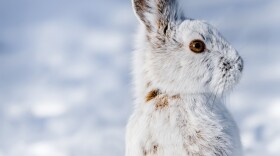Where do Montana birds go in the winter? What is it like for them in a tropical habitat? What is it like for us, to see them and note the passing of time in the natural world? Why is it so special during this worldwide COVID pandemic when we humans are so physically constrained? I cannot get on an airplane, but birds can fly.
I had no idea, when Panama's airports closed in March last year and we were only allowed out of our house for two hours, three times a week, that nearly a year later, we would still not be allowed out of the house on weekends. What has happened to my experience of time and space, when the furthest I have been in the last months is a four-mile drive from the house, to look at the Pacific Ocean for a change of skyline, and to watch the ships approaching the Panama Canal?
I ask myself, does limitation lead to expansion? How come I noticed in December, for the first time, a migratory Lesser Yellowlegs feeding in a small wetland just a mile from where I have lived for the last twenty years, accompanied on occasion by Spotted or Solitary Sandpipers, also migratory, maybe from Montana? Another first, seeing pond slider turtles swim in the murky water, or even emerge onto the muddy banks to lay their eggs, though they must have been doing that forever! It seems my awareness has grown, while my sense of physical space has contracted.
On a morning walk by the wetland, I´m almost overwhelmed by this new awareness - is that a crocodile or a caiman apparently having a snooze on the bank, and another one lurking in the water with barely its eyes visible? Where does the family of large rodent capybaras go when this wetland shrinks in the dry season? Do the yellowlegs notice the egrets, the herons, and kingfishers they share the wetlands with, and make them feel more at home? Or notice the osprey flying overhead?
But then what do they think of the outlandish call of the “cocaleca” (the Gray-cowled Wood-rail) or having to share with the Purple Gallinule and the Wattled Jacana, that take their long-toed steps among the floating fleshy vegetation?
Oh, there's a migratory Northern Waterthrush bobbing up and down by the water´s edge, and during the Christmas bird count I catch sight of a Yellow Warbler flying nervously from one green stalk to another, close to where a resident raft of orangy pink-billed Wichichi or Black-bellied Whistling-Ducks are taking cover. A large family of Gray-headed Chachalacas lands noisily in some overhanging trees and I hear a Lineated Woodpecker drumming away.
What is so lovely and reassuring, somehow, is that the migratory birds, from Montana and elsewhere, turn up on cue, as they have been doing for thousands of years. The only difference is that before I didn't notice! And this year I finally saw them. They fill me with sights and sounds, movement, colour, and perspective, all of which help me perceive something quite basic, that we humans with our dramas are just a small part of this planet, which has its own rhythms and ways of being. This particular drama will fade away - eventually.
And so the daily roller-coaster realities fade into the background and I feel accompanied, and alive.
This Field Note was written in the Field Notes writing workshop at the Montana Natural History Center. I’m Charlotte Elton for Field Notes, brought to you by the Montana Natural History Center, providing natural history education for schools and the public throughout Montana. For information on upcoming events and programs at the Center, please call 327.0405 or visit our website at MontanaNaturalist.org.





